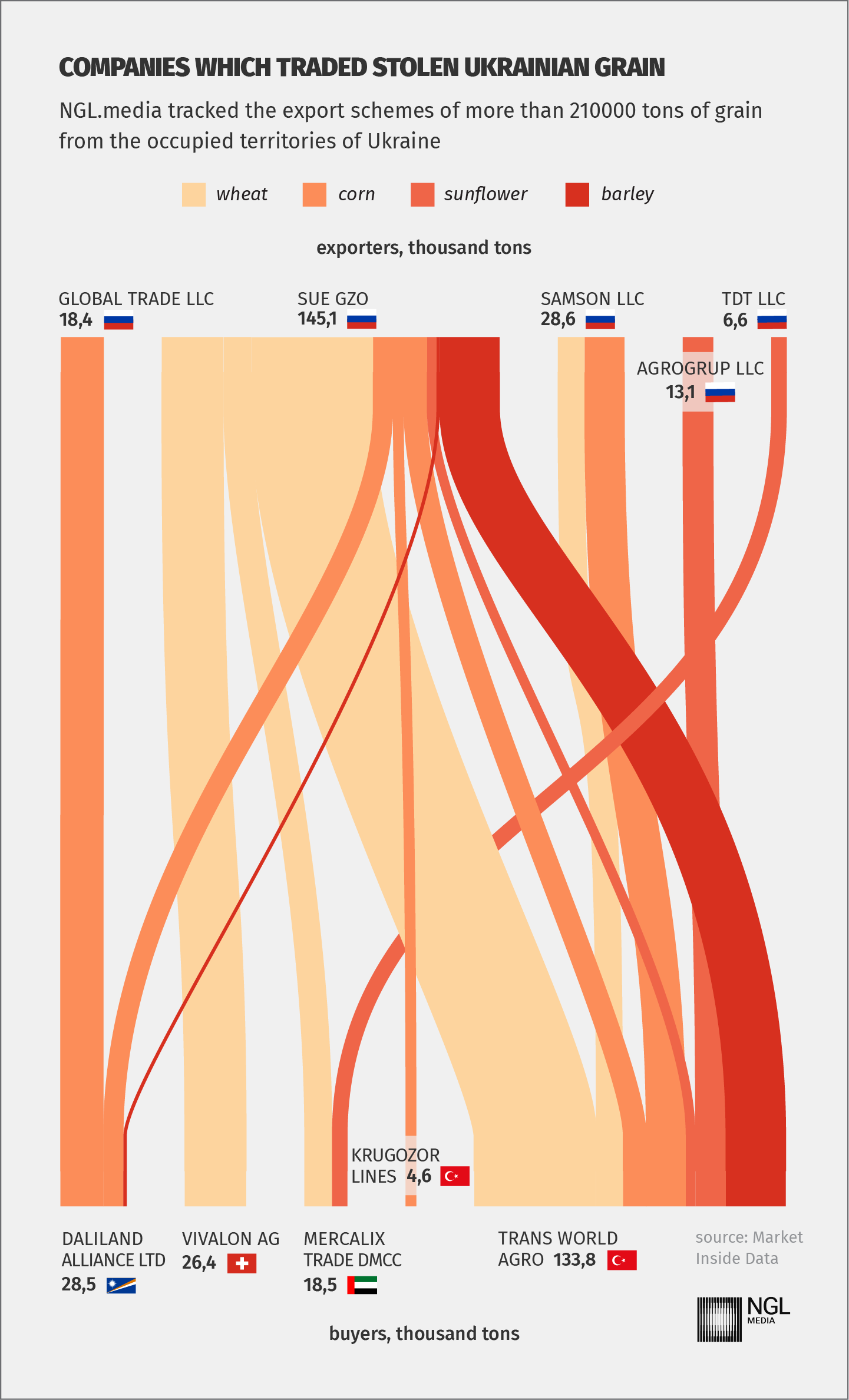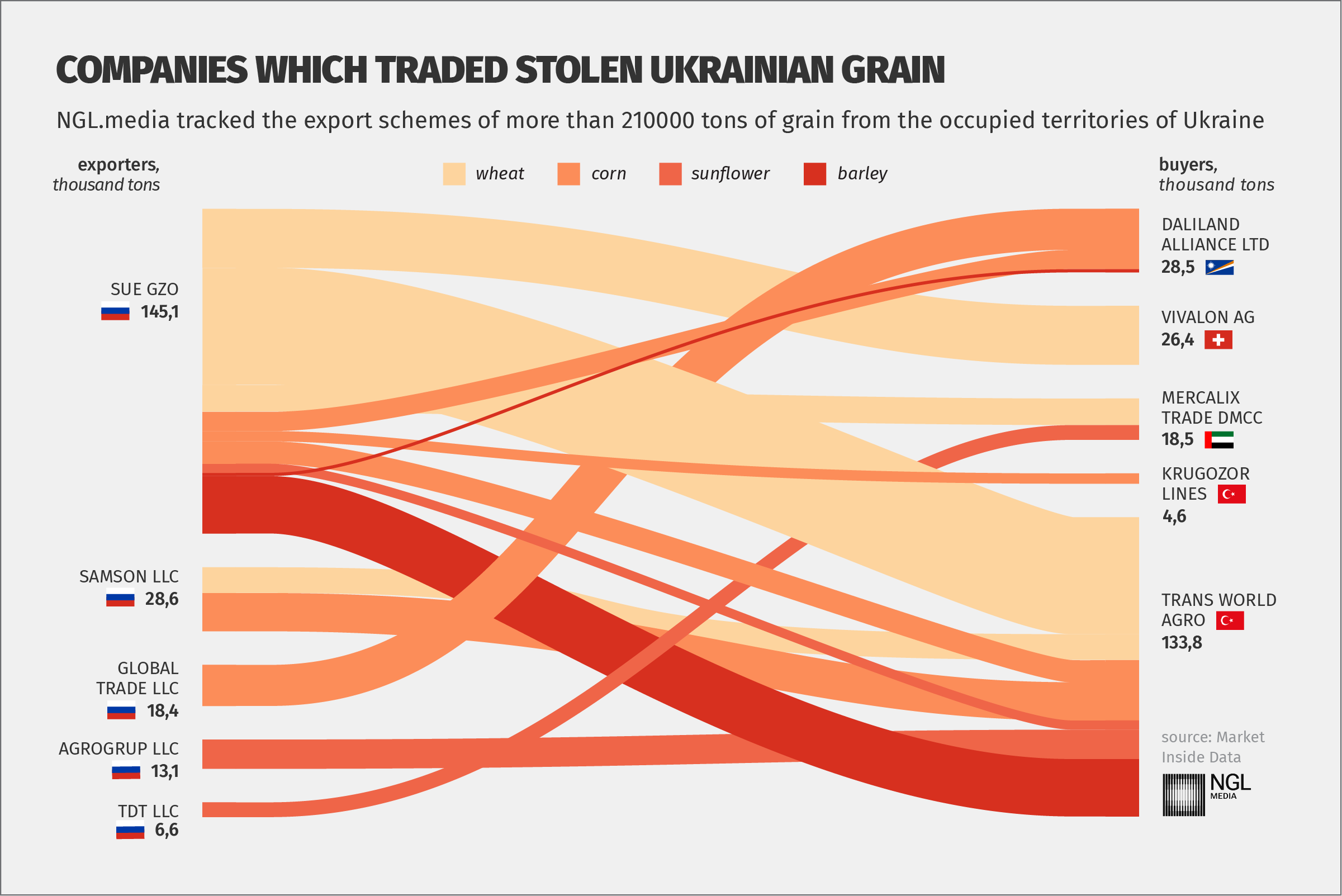Last year alone, a state-owned company set up by Russians took out nearly 212,000 tons of grain worth an estimated $46 million from the occupied part of Zaporizhzhia region. Ukrainian grain is transported to Turkey, Libya, and Israel, and European companies are involved in this as well. This is evidenced by Russian export data that NGL.media analyzed.
Of course, the analysis of such dark trade has its limitations, so this is far from exhaustive. We can evidence this volume through the data from customs declarations which indicate the Russian State Grain Operator, the main exporter of grain from the occupied territories, as the exporter or customs applicant.
This Russian state-owned company has created a whole scheme to take stolen Ukrainian grain to international markets and legalize it there. Ukrainian citizens were also involved in this scheme, including a former deputy of Verkhovna Rada.
Who is selling Ukrainian grain?
In mid-May 2022, less than three months after the invasion started, the Russians established the state unitary enterprise State Grain Operator (GZO further in the text) in occupied Melitopol.
It is this company, whose founding documents were approved by the head of the occupation administration, Yevhen Balytskyi Yevhen Balytskyi, 54, born in Melitopol, in 2012-2019 was a member of parliament from the Party of Regions and the Opposition Bloc. After Russian full-scale invasion he became a collaborator and headed the occupation administration of the occupied part of Zaporizhzhia region with the centre in Melitopol. He was sentenced in absentia in Ukraine to 15 years in prison. , that seized most of the land, grain complexes and agricultural machinery in the occupied part of Zaporizhzhia region as of March 2024, about 70% of the region’s territory remains occupied . The group operated without official registration in the all-Russian register for some time, and the corresponding entry appeared there only in December 2022.
The active trade in stolen Ukrainian grain did not go unnoticed. In early 2023, this company was subject to US sanctions, followed a month later by sanctions imposed by Ukraine and the United Kingdom. However, NGL.media found out that the company successfully circumvented these restrictions by using shell companies to trade on international markets.
In 2023 alone, GZO exported 212 thousand tons of Ukrainian grain worth an estimated $46 million. Of this amount of grain, GZO directly exported 145 thousand tons, and almost 67 thousand tons were exported through Russian shell companies, in which GZO is listed as a customs applicant. This is evidenced by the information from the international database of export and import operations analyzed by NGL.media Market Inside.
Russian shell companies operating under GZO umbrella – Agrogroup, Samson, Tesori Della Terra, Global Trade and Genidi Group – are used for disguise. It is with these companies that international buyers conclude grain purchase agreements, and this allows them to claim that they did not buy anything directly from the GZO. By using intermediaries, GZO further disguises the Ukrainian origin of the grain.
However, russian disguise is not very convincing. For example, one of these companies, Agrogroup, is run by Alexey Dzhurkin, who is also the deputy director general of the GZO. It was him telling that GZO plans to expand its activities in the occupied part of Zaporizhzhia region and increase grain shipments.
Before coming to Melitopol, Dzhurkin lived in Sevastopol. He came there from Russian St. Petersburg after the annexation of Crimea. He even made two attempts to become a deputy from the Liberal Democratic Party of Russia in the occupied Crimea: in 2019, he ran for the Sevastopol City Council, and in 2020, he was nominated for the district council of one of the city’s municipal districts.
In addition to Agrogroup, other related companies selling Ukrainian grain on foreign markets are Tesori Della Terra, where the founder is Irina Kurganskaya, and Samson in which Tesori holds 80% of the authorized capital. The remaining 20% of Samson belongs to Irina Samsonova, 50, who has also been living in Sevastopol for several years. She came to the annexed Crimea from Krasnoyarsk, Siberia, where Kurganskaya is from. In addition to her stake in Samson, Samsonova also makes money by selling commercial real estate in Sevastopol.
Although Tezori Della Terra was registered only in September 2023, according to customs data, by the end of the year the company had already exported more than 18 thousand tons of grain. For example, in December it exported 6.6 thousand tonnes of sunflower seeds worth $2.3 mln to Mercalix Trade Dmcc from the UAE, data from Market Inside say. At the same time, GZO is indicated as the declarant in the customs information for this batch of sunflower seeds. Two other shipments of Tessori Della Terra to Mercalix Trade Dmcc, list the sanctioned GZO as both the exporter and the declarant.
NGL.media asked Mercalix Trade Dmcc to comment on these deliveries. In response, the UAE-based company stated that it had one contract with Tesori Della Terra, which they had cancelled as soon as they received information that the appointed vessel was subject to sanctions “due to several activities”.
“We have raised an objection against Tezori Della Terra on 29 December 2023. Later when we received credible information that Vessel was not loaded in Kavkaz, we have sent an e-mail rejecting the Vessel and terminating the contract on 8 January 2024 by e-mail”, Mercalix Trade DMCC response states.
Mercalix Trade DMCC did not comment on the two other shipments from Tesori Della Terra mentioned above, emphasizing instead that the company had no contact with the Russian state-owned GZO and was committed to complying with all international sanctions. And when asked for more details, they claimed they were conducting an internal investigation.
One Black Sea port
The port of Kavkaz mentioned in Mercalix Trade DMCC’s response is located in the Kerch Strait, and – importantly – on the internationally recognized territory of Russia, in the Krasnodar Krai. Formally, it is here that the grain that GZO exports to foreign companies is loaded, which makes it possible to indicate “country of origin – Russia” in customs documents.
In reality, the company can ship grain through the seized Ukrainian ports in Berdiansk or Mariupol, which are much closer to the occupied Melitopol where the company is based, explains Kateryna Iaresko, a journalist with the SeaKrime Myrotvorets Center project.
The Myrotvoretrs Center and the KibOrg community regularly monitor the movement of grain ships in the Azov-Black Sea basin. According to Iaresko, the Russians have recently significantly increased the number of vessels in the ports of Berdiansk and Mariupol, having transferred part of the merchant fleet from their northern seas.
“The ships are coming one after another. For example, in Sevastopol’s Dockyard Bay, where Avlita grain terminal is located, it is actually busy all the time. They are even using a berth that was previously used for loading non-foods. So it is very serious,” Iaresko says.
She suggests that some of the grain from Melitopol may be transported by land to the Azov port in the Rostov region of Russia, and then loaded onto Russian ships that transport it to the Kavkaz port. “It is very difficult to track this,” Iaresko said. “There are some records, but there is no case with all the evidence yet.
This assumption is confirmed by the large-scale forgery of Russian documents for grain imported to Crimean ports, which was recently discovered by Texty.org.ua investigators.
Who buys Ukrainian grain?
The largest buyer of grain from Russian companies, in which GZO is a declarant and often an exporter, is the Turkish company Trans World Agro Tarim Ihracat Ithalat Limited Sirketi (Trans World Agro further in the text). We are talking about almost 134 thousand tons of grain worth USD 28.6 million.
Trans World Agro was established in December 2022 by Israeli citizen Leon Mase. Leonid Pashkovsky, a Ukrainian citizen of this formally Turkish company.

Leonid Pashkovsky, director of Trans World Agro until December 2023. Photo taken in 1999 (Viktor Pobedinsky / UNIAN)
After media began to take an interest in Trans World Agro’s activities, the names of Pashkovsky and Mace disappeared from the company’s founding documents. Instead, in December 2023, another Ukrainian, Dmytro Lyskanich, 63, a sailor from Kherson, became the new owner and director.
The date of Trans World Agro founding and its new, obviously fictitious owner suggest that this company was created for the purpose of exporting grain from the occupied territory of Ukraine. Even the email address info@transworldagro.com indicated in the agreements with Trans World Agro published by the SeaKrime and KibOrg projects, turned out to be fictitious.
Leonid Pashkovsky, 64, was quite well-known at his time. In 1998 he won the election to the Verkhovna Rada from Kherson constituency 184, heading the board of the JSC “National Gas Company” at the time. He was not particularly memorable in the parliament, except for several transitions between the then pro-government factions of the PDP, the Revival of Regions, and the Democratic Union.
NGL.media was unable to find Pashkovsky’s current contacts, and even his daughters or his ex-wife did not respond to our messages. His former and current business partners and parliamentary colleagues were also unable to help with contacts.
Apparently, Leonid Pashkovsky leads a very secretive life. He does not use social media, and his only available photo was taken 25 years ago during his time as a member of parliament.
However, our source said that Leonid Pashkovsky has been outside Ukraine for two years. He crossed the Ukrainian-Hungarian border in March 2022 and has not returned to Ukraine since.
In December 2023, Dmytro Lyskanich became the new director and owner of Turkish Trans World Agro. This change is likely due to the interest of SeaKrime and KibOrg, which, starting in September 2023, published several materials about the activities of Trans World Agro and Pashkovsky.

Dmytro Lyskanich, a 63-year-old sailor from Kherson, turned out to be the formal owner and director of the Turkish company that exports the most stolen grain from Ukraine (Facebook photo)
Dmytro Lyskanich, 63, was born in Kherson, but has been living in Israel for a long time; last time he visited Ukraine was in 2021. However, he became the owner and director of Trans World Agro as a citizen of Ukraine. The Turkish state registry contains his Ukrainian passport number.
He had nothing to do with grain trading before. As Lyskanich himself writes one the russian social media, he graduated from Kherson Maritime College in 1980 and seems to have devoted his entire life to seafaring. His active profile of a second mate on a seamen employment platform proves this.
Dmytro Lyskanich did not respond to NGL.media’s requests for comment.
Who else is buying Ukrainian grain
The second largest buyer of Ukrainian grain, according to customs declarations, is Daliland Alliance Ltd registered in the Marshall Islands.
GZO is the declarant and exporter in four out of six consignments of grain for this company. In two more consignments, the Russian company Global Trade is the exporter, but the declarant is Vladislav Timokhin. A person with the same surname is also listed in most customs declarations where GZO appears, but due to lack of data, we didn’t manage to identify this person accurately.
Daliland Alliance Ltd is registered in the offshore zone of the Marshall Islands, so the owners of the company are hidden – it is only known that it exists since 2019. There are no public contacts of the company. The contracts KibOrg published contain only the signatory’s name – Juliette Michel Clarisse, a citizen of the Seychelles. This woman is also a director of a number of British companies, including Delanore limited with which the nephew of the president of Turkmenistan was associated and which appeared in the documents. This company was liquidated after journalist investigations.
According to YouControl, Juliette Michelle Clariss turned out to be the beneficiary of more than 200 companies in Ukraine through the British company Klariks Capital Limited. However, according to the British registry, this company is controlled by a 35-year-old Ukrainian, Kateryna Dmytrieva from Dimitrov (now Myrnohrad), Donetsk region. She has been involved with dozens of companies in Ukraine and still remains a beneficiary in some of them.
The third largest buyer is Vivalon AG, the Swiss company whose involvement in the export of Ukrainian grain has already attracted the interest of the most influential Swiss newspaper Neue Zürcher Zeitung.
A Swiss think tank Public Eye has discovered Russian customs declarations through a trade database Globalwits. They show that in September-October 2023, Vivalon AG bought five shipments of grain from Russian exporter Samson.
In these customs declarations, the GZO is listed throughout as the shipper and declarant of the cargo.
Data from another database, Market Inside, analyzed by NGL.media, confirms this information, including the fact that the State Unitary Enterprise GZO is the declarant and exporter in all five deliveries is State Unitary Enterprise “State Grain Operator” – i.e., the GZO. The total value of goods amounted to USD 4.9 million.
According to Market Inside, another 4.6 thousand tons of corn were to be exported to Turkey for Krugozor lines lojistik deniz hava kara tasimiciligi limited sirket. This is a Turkish company whose founder until September 2022 was an Azerbaijani citizen Elbrus Huseinov. He has been working both with Turkey and Russia. Last fall, the company was taken over by Makhnur Huseynova, also an Azerbaijani citizen.
***
The activities of the Russian State Grain Operator are of interest not only to journalists, but also to Ukrainian law enforcement. Currently, Nikita Busel and Aleksey Dzhurkin, the heads of the State Grain Operator, are charged in Ukraine under Art. 438 of the Criminal Code (violation of the laws and customs of war). Their case is being considered by the Shevchenkivskyi District Court in Kyiv.
Authors Oleksandra Gubytska and Natalia Onysko, editor Oleh Onysko, infographics by Nazar Tuziak, cover by Rostyslav Abramets


